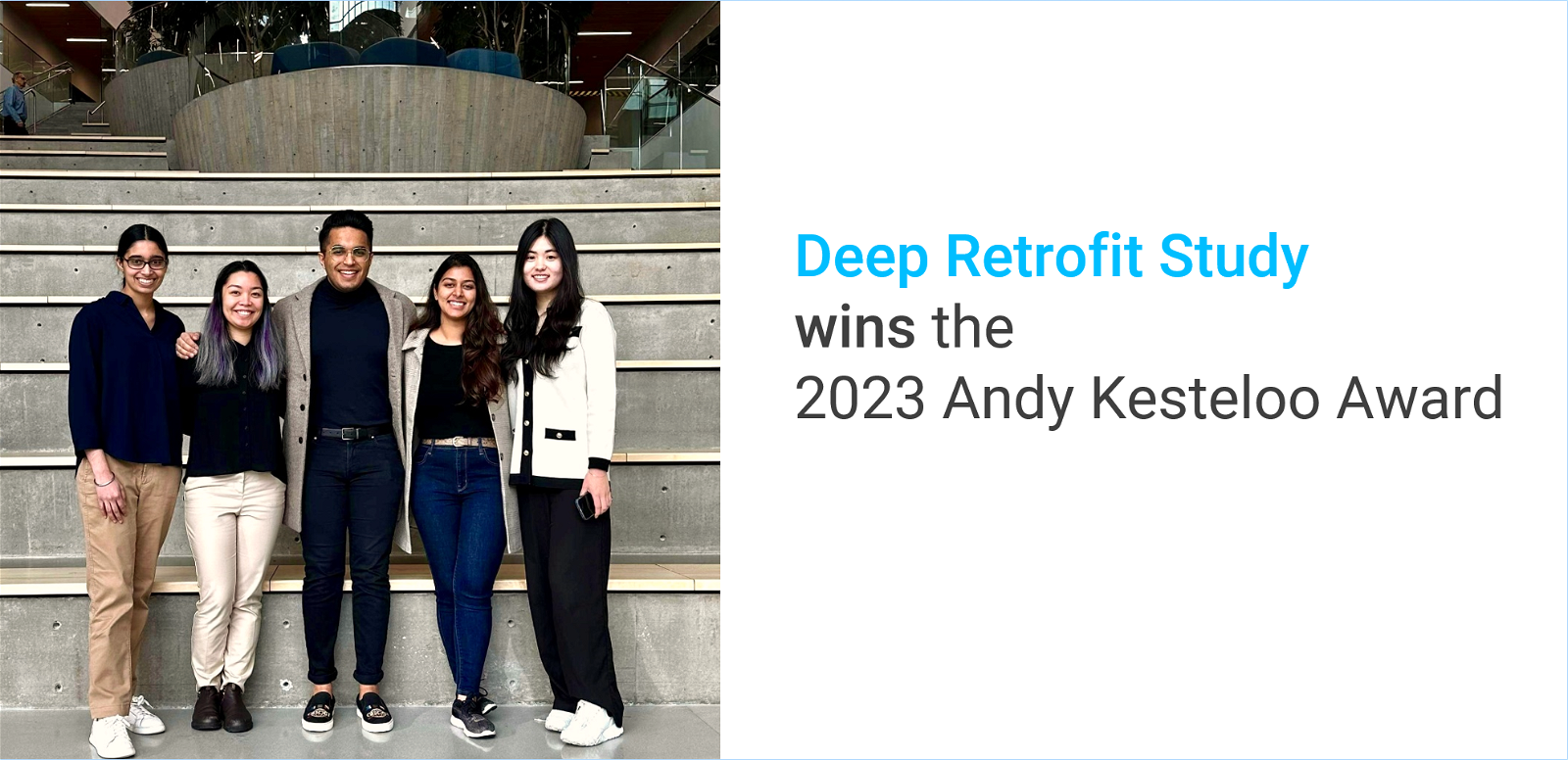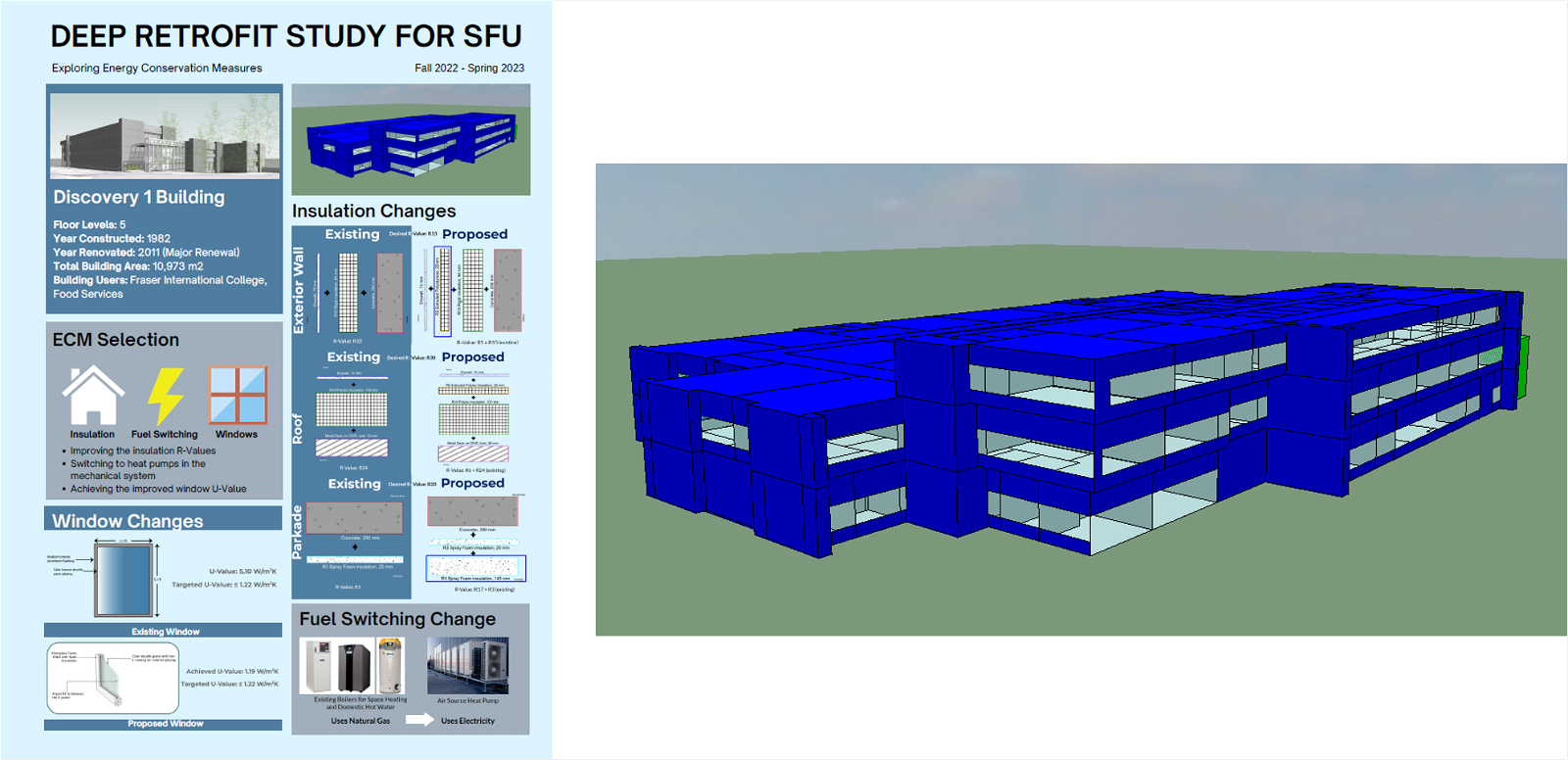- Culture
- Notre équipe
- Services
- Projets
- Médias
- Nos bureaux
- Rechercher
Deep Retrofit Study wins the 2023 Andy Kesteloo Award
- Détails

Every year, students have an opportunity to showcase their skills by submitting a project to the Andy Kesteloo Memorial Project Award through Canada Green Building Council. Presented in memory of a visionary green building advocate, the award goes to a student project that demonstrates leadership, innovation, and a creative vision for the future of sustainable design in the field of green building and communities.
The 2023 award went to a student team led by Danielle Arciaga from Simon Fraser University (SFU who is a Building Performance Engineer with RJC Engineers, for an ambitious project: the decarbonization of the Discovery 1 Building at SFU’s Burnaby campus. Danielle’s group members included Gurvaani Dhani, Manin Khunger, Simran Pandher, and Clara Park.
“It was a really rewarding experience and highly applicable to the work that I do now at RJC. I’m very fortunate to have worked with my team as we started our program together and got to finish it together with our capstone project” shares Danielle. “I was also able to learn from many professionals within the building industry, one person specifically being Mohammad Fakoor as he was our main collaborator and initiator for the project.”
The project’s aim was to help SFU reduce their operational GHG emissions to 50 percent of 2007 levels by 2025. The team explored different retrofit approaches and how they affect building energy efficiency and carbon emissions, and explored related economic opportunities while giving back to the SFU community.

Aligned with the university’s 2025 Sustainability Plan, this project consisted of an Energy Conservations Measure (ECM) study that considered the building’s major components, namely the mechanical system, lighting system, building envelope, on-site renewable energy generation, and building automation. A concept map was used to brainstorm different ECMs and weigh them against specific selection criteria, with emission reduction as the main goal along with minimizing the building’s energy demand. Various methods were considered to reduce the energy demand, such as occupant awareness, continuous commissioning of the building, and efficient mechanical systems.
“It is really rewarding to have our hard work recognized through the CAGBC Andy Kesteloo Memorial award, and applying what we learned in school to generate results to a tangible project that could have great impacts to GHG emissions, “says Danielle.
A list of ECMs was created and a selection was made using a weighted decision matrix. Regulations such as the National Energy Code for Buildings (NECB), the British Columbia Building Code, and British Columbia Step Code were considered when assessing the ECMs to ensure the requirements for building compliance are met, as well as industry standards such as ASHRAE and the Energy Star ratings. Upon reviewing building drawings and mechanical systems, and considering the regulations in place, ECMs were developed to address insulation, windows, and mechanical system improvements. The final list of ECMs were reflected in a 3D model and a baseline model including building schematic, mechanical drawings, and utility data was developed.
By incorporating the recommended ECMs for SFU’s Discovery 1 building, the team found that insulation, windows, and mechanical fuel switching are deep retrofits capable of reducing energy use and GHG emissions within a building, increasing thermal comfort and contributing to SFU’s 2025 Sustainability Plan. A model was created to justify the ECM recommendations along with a Climate Risk Assessment for further plans to improve the performance of the building.
“It is great to see students combine theory and practice on real-life projects and participate in greening the buildings they actually use”, says CAGBC President and CEO Thomas Mueller. “The scope of this project is similar to projects completed by professional firms and that’s just additional evidence that sustainability students can be change agents before graduating.”
This project demonstrates leadership by using the latest studies and best practices incorporated by building performance consultants. Its scope and replicable framework will serve as a blueprint for similar buildings looking to decarbonize effectively. With a collaborative approach and commitment to excellence, this SFU team managed to complete a comprehensive study that will have an immediate impact on an existing building.